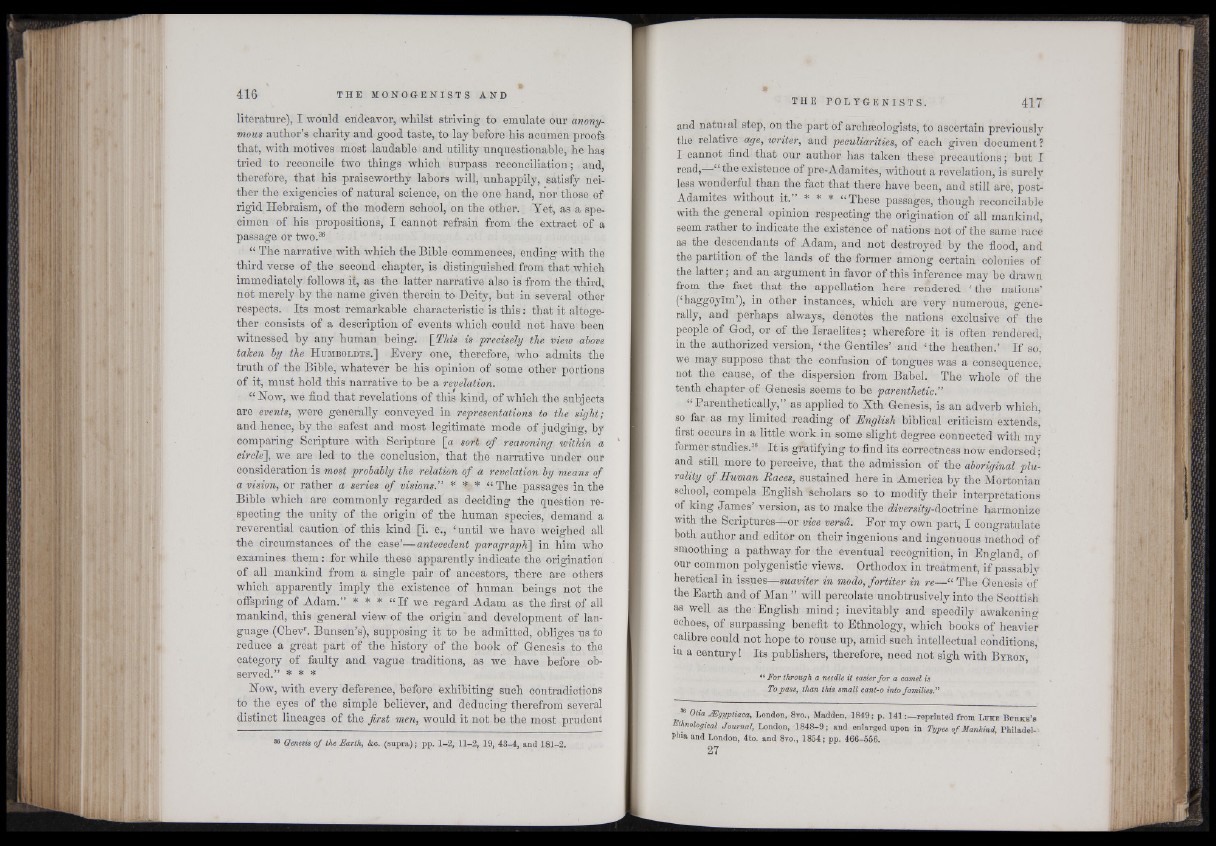
literature), I would endeavor, whilst striving to emulate our anonymous
author’s charity and good taste, to lay before his acumen proofs
that, with motives most laudable and utility unquestionable, he has
tried to reconcile two things which surpass reconciliation; and,
therefore, that his praiseworthy labors will, unhappily, satisfy neither
the exigencies of natural science, on the one hand, nor those of
rigid Hebraism, of the modern school, on the other. Yet, as a specimen
of his propositions, I cannot refrain from the extract of a
passage or two.36
“ The narrative with which the Bible commences, ending with the
third verse of the second chapter, is distinguished from that which
immediately follows it, as the latter narrative also is from the third,
not merely by the name given therein to Deity, but in several other
respects. Its most remarkable characteristic is this: that it altogether
consists Of a description o f events which could not have been
witnessed by any human being. [This is precisely the view above
taken by the H umboldts.] Every one, therefore, who admits the
truth of the Bible, whatever be his opinion of some other portions
of it, must hold this narrative to be a revelation.
“How, we find that revelations of this kind, of which the subjects
are events, were generally conveyed in representations to the sight;
and hence, by.the safest and most legitimate mode of judging, by
comparing Scripture with Scripture [a sort of reasoning within a
circle'], we are led to the conclusion, that the narrative under our
consideration is most probably the relation of a revelation by means of
a vision, or rather a series of visions.” * * * “ The passages in the
Bible which are commonly regarded as deciding the question respecting
the unify of the origin of the human species, demand a
reverential caution of this kind [i. e., ‘until we have weighed all
the circumstances of the case’—antecedent paragraph] in him who
examines them: for while these apparently indicate the origination
of all mankind from a single pair of ancestors, there are others
which apparently imply the existence of human beings not the
offspring of Adam.” , * * * “ If we regard Adam as the first of all
mankind, this general view of the origin and development of language
(Chevb Bunsen’s), supposing it to be admitted, obliges us to
reduce a great part of the history of the book of Genesis to the
category of faulty and vague traditions, as we have before observed.”
* * *
How, with every deference, before exhibiting such contradictions
to the eyes of the simple believer, and deducing therefrom several
distinct lineages of the first men, would it not be the most prudent
M Genesis of the Earth, Sec. (supra) ; pp. 1-2, 11-2, 19, 43-4, and 181-2.
and natuial step, on the part of archaeologists, to ascertain previously
the relative age, writer, and peculiarities, of each given document?
I cannot find that our author has taken these precautions; but I
read, “ the existence of pre-Adamites, without a revelation, is surely
less wonderful than the fact that there have been, and still are, post-
Adamites without it.” * * * “These passages, though reconcilable
with the general opinion respecting the origination of all mankind,
seem rather to indicate the existence of nations not of the same race
as the descendants of Adam, and not destroyed by the flood, and
the partition of the lands of the former among certain colonies of
the latter; and an argument in favor of this inference may be drawn
from the fact that the appellation here rendered ‘ the nations’
(‘haggoylm), in other instances, which are very numerous, generally,
and perhaps always, denotes the nations exclusive of the
people of God, or of the Israelites; wherefore it is often rendered,
in the authorized version, ‘the Gentiles’ and ‘the heathen.’ If so,
we may suppose that the confusion of tongues was a consequence,
not the cause, of the dispersion from Babel. The whole of the
tenth chapter of Genesis seems to be parenthetic.”
“ Parenthetically, as applied to Xth Genesis, is an adverb which,
so far as my limited reading of English biblical criticism extends,
first occurs in a little work in some slight degree connected with my
former studies.36 It is gratifying to find its correctness now endorsed;
and still more to perceive, that the admission of the aboriginal plurality
of Human Races, sustained here in America by the Mortonian
school, compels English scholars so to modify their interpretations
of king James’ version, as to make the diversity-doctrine harmonize
with the Scriptures—or vice versa. Eor my own part, I congratulate
both author and editor on their ingenious and ingenuous method of
smoothing a pathway for the eventual recognition, in England, of
our common polygenistic views. Orthodox in treatment, if passably
heretical in issues—suaviter in modo, fortiter in re—“ The Genesis of
the Earth and of Man ” will percolate unobtrusively into the Scottish
as well as the English mind; inevitably and speedily awakening
echoes, of surpassing benefit to Ethnology, which books of heavier
calibre could not hope to rouse up, amid such intellectual conditions,
in a century! Its publishers, therefore, need not sigh with B yron,
“ For through a needle it easier for a camel is
To pass, than this small cant-o into families”
86 Otia JEgyptiaca, London, 8vo., Madden, 1849; p. 1 4 1 reprinted from L u k e B u r k e ’s
Ihnological Journal, London, 1848-9; and enlarged upon in Types of Mankind, Philadelphia
and London, 4to. and 8vo., 1854; pp. 466-556.